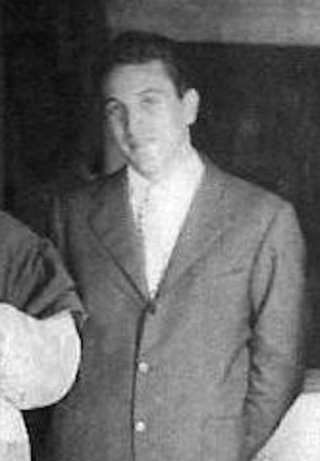
Horror is a film genre that seeks to elicit physical or psychological fear in its viewers. Horror films often explore dark subject matter and may deal with transgressive topics or themes. Broad elements include monsters, apocalyptic events, and religious or folk beliefs.

Antonio Margheriti, also known under the pseudonyms Anthony M. Dawson and Antony Daisies, was an Italian filmmaker. Margheriti worked in many different genres in the Italian film industry, and was known for his sometimes derivative but often stylish and entertaining science fiction, sword and sandal, horror/giallo, Eurospy, Spaghetti Western, Vietnam War and action movies that were released to a wide international audience. He died in 2002.

Jesús Franco Manera, also commonly known as Jess Franco, was a Spanish filmmaker, composer, and actor, known as a highly prolific director of low-budget exploitation and B-movies. He worked in many different genres during his career, but was best known for his horror and erotic films, often incorporating surrealist elements.
Japanese horror is horror fiction derived from popular culture in Japan, generally noted for its unique thematic and conventional treatment of the horror genre differing from the traditional Western representation of horror. Japanese horror tends to focus on psychological horror, tension building (suspense), and the supernatural, particularly involving ghosts (yūrei) and poltergeists. Other Japanese horror fiction contains themes of folk religion such as possession, exorcism, shamanism, precognition, and yōkai. Media in which the genre of Japanese horror fiction can be found include artwork, theater, literature, film, anime and video games.

The Awful Dr. Orloff is a 1962 Spanish-French horror film written and directed by Jesús Franco. It stars Howard Vernon as the mad Dr. Orloff who wants to repair his disfigured daughter's face with skin grafts from other women with the aid of a slavish, blind henchman named Morpho. A co-production between Spain and France, filmed in Madrid, the film is considered to be the earliest Spanish horror film.

Mexploitation is a film genre of low-budget films that combine elements of an exploitation film and Mexican culture or portrayals of Mexican life within Mexico often dealing with crime, drug trafficking, money and sex.

Jaume Balagueró Bernat is a Spanish film director and screenwriter known for his horror films, most notably the acclaimed REC series.

The Ancines Woods is a 1970 Spanish drama/horror film co-written, produced, and directed by Pedro Olea. It is based on the novel by Carlos Martínez-Barbeito, and is partially based on the life of Manuel Blanco Romasanta and his alleged lycanthropy.
New French Extremity describes a range of French films made at the turn of the 21st century that were considered extreme or transgressive. Films of the New French Extremity are characterized by graphic depictions of violence, especially sexual violence, and explicit sexual imagery.

The House That Screamed, also released as The Finishing School, is a 1969 Spanish slasher film written and directed by Narciso Ibáñez Serrador, and starring Lilli Palmer, Cristina Galbó, John Moulder-Brown, and Mary Maude. It follows Señora Fourneau, the strict headmistress of a nineteenth-century French boarding school for girls where the students begin to disappear under unusual circumstances.

Silvia Solar was a French actress and prolific minor star in Spanish cinema. The majority of her appearances were in the 1960s and 1970s.
Javier AguirreFernández was a Spanish film director, writer and producer.

A Gothic film is a film that is based on Gothic fiction or common elements from such fictional works. Since various definite film genres—including science fiction, film noir, thriller, and comedy—have used Gothic elements, the Gothic film is challenging to define clearly as a genre. Gothic elements have especially infused the horror film genre, contributing supernatural and nightmarish elements.
Film Ideal was a biweekly film magazine, which was published in Madrid, Spain, between 1956 and 1970.
Something Bitter in the Mouth is a 1969 Spanish film directed by Eloy de la Iglesia. It is a blend of psychological thriller, erotic-intimist melodrama and sociopolitical parable.